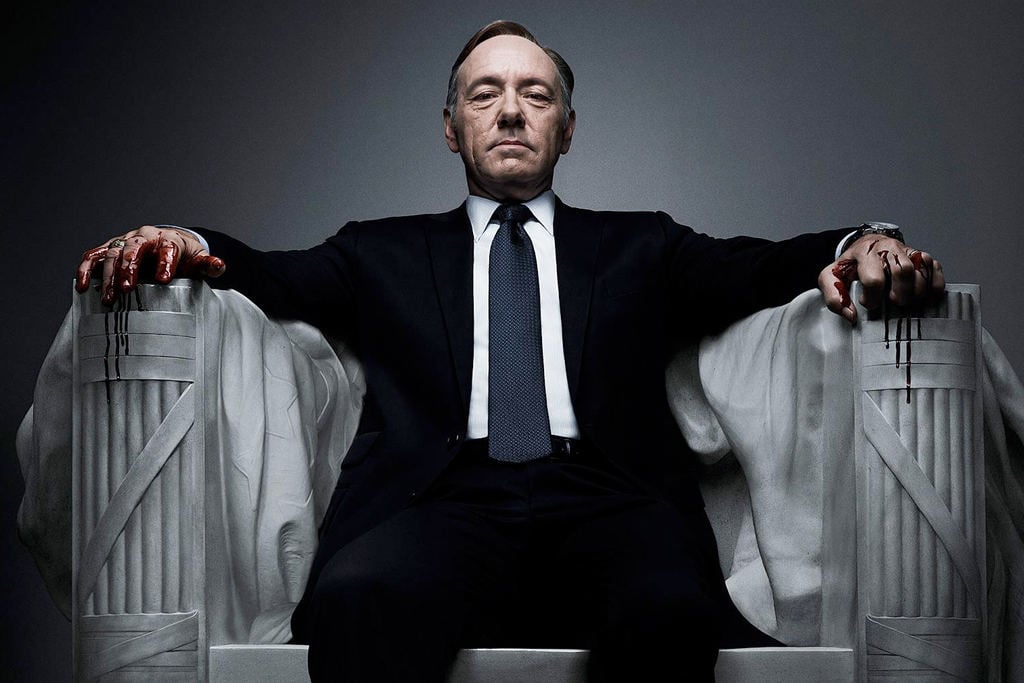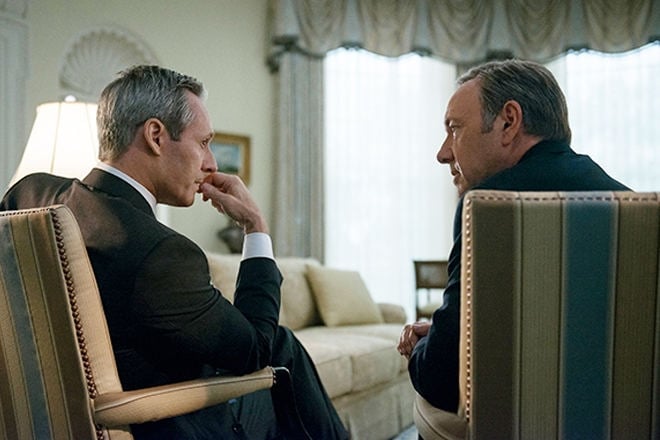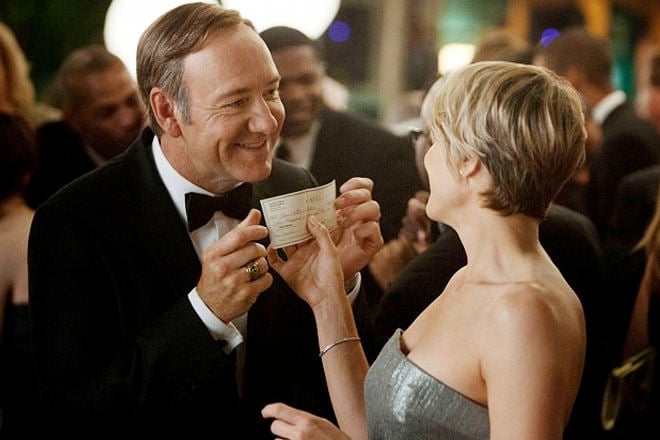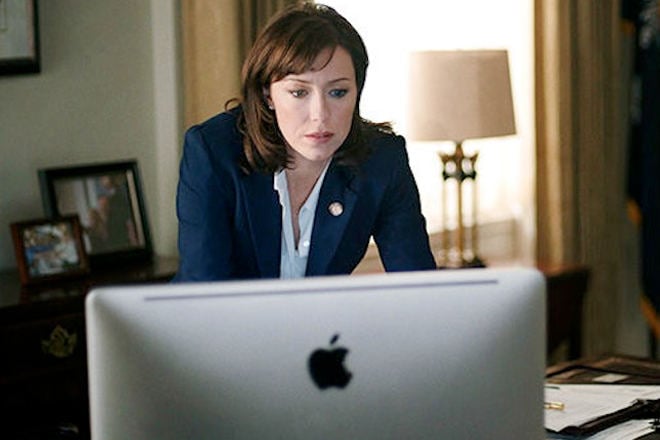House Of Cards Hangover: Was Season Two Worth The Binge?
A look back at the winners and losers of the show's second season. (Warning: spoilers!)

This is a full recap of House Of Cards’ second season. If you’ve only watched up to episode six, click here. If you haven’t watched any, get away.
–
So for many people, season two of House of Cards has now ended. Maybe for you it ended a couple of weeks ago, if you binged hard enough.
Binged is the right word. However we may have landed on the adjective, it certainly hasn’t been more apt in its usage than describing the sensation of watching House of Cards. It’s the red velvet cupcake twelve-pack of prestige drama. It’s a televisual Buck’s Night. Like any binge session I’ve ever endured, I rode the rollercoaster of decadent indulgence: I laughed at the excess, gasped at the insanity, I squirmed from consumption pains. The next day I felt bleary-eyed and vaguely sick. I don’t think I gained anything, but I guess I had fun?
Let’s run down the winners and losers of House of Cards, season two, round two.
–
Frank vs. Politics
Who won? Frank
This season saw the personal enter the political arena. Frank can’t bully his way to muster votes any longer – instead he has to deal day-to-day, face-to-face, with the most powerful man in town. The long game of season two sees Frank working to relinquish the influence that energy mogul Tusk has over President Walker, while he props POTUS up for an inevitable fall. Some of this was great – watching Frank work his disingenuous charm is always a treat, and the relationship between the First Lady and Claire nicely mirrored and intertwined with the workings of the Oval Office.
The big problem? Lack of a worthy foe. While Frank Underwood may very well join the ranks of Iago and Richard III as an infamously top class conniver, Walker is no Othello (or Ned Stark to Underwood’s Joffrey, if you’d like to keep the references current). Walker, as both written and acted, is a fly to be shooed in the opening scenes, not some climactic totem that you plot to eventually topple.

“It seems like your’e plotting something about me, Frank. Please do let me know if it becomes evil. Drop me a note or something.”
This mismatch of adversaries sucked up energy for hours. In the end, Walker was exorcised from office due to the strain of rumour and in-party self-preservation. Based on the past twelve months of Australian politics, Walker’s demise seemed a perfectly reasonable one for a national leader (and maybe a worthwhile, if boring, show to make?). But compared to the high drama — delivered in the back-row reaching theatrics of Mr. Spacey — it falls flat and reads somehow, in context, as unrealistic. It’s a little like seeing a Die Hard movie where Bruce Willis trips getting off an escalator: yes he’s survived an explosion or three, but rolls his ankle? Ridiculous!
At season’s end, Frank takes his rightful place (for a dark and cynical cable type television show, that is) in the oval office. Wherever can he, and the show, go from there?
So far the series hasn’t strayed too far from the plot of the UK original (so if you want to steer clear of potential spoilers, stay away from the Wiki summaries), but the American political system could throw up some interesting curveballs for the Underwoods, especially if we followed them to the next election. Would House of Cards dare attempt to create a sympathetic Republican to try our allegiance to Frank? Or might it double down and create a villain to top them all?
–
Personal vs. Politics
Who won? Politics, sadly.
Call me shallow, call me fickle, but the fact that a security guard had a threesome with the Vice President and his wife is much more interesting to me than the outcome of Claire’s military/civilian sexual assault bill. Compared with the plot heavy season one, we actually saw some friction between the political and personal this year — though little of it seemed to affect the coldly simpatico Underwoods. Claire’s story this season bolted from the gates with a covered-up rape charge, a televised confession/allegation, and an assassination scare. It folded just as quickly, once Claire had traded everything she’d built up. Her own bill, which strayed dramatically from its original, personal origin, and her relationship with the first lady all went under in efforts to ensure Frank’s future. Even with a brief jag of banister-gripping tears, Claire’s as inscrutable as ever by series end.

“Look darling, I sold our last shred of relatable humanity for 28 bucks! Season three, starring power-hungry automatons, here we come!”
That battle with Tusk that we thought would explode instead fizzled. Tusk threw all of the Underwood’s dirty secrets and sometime friends into the maw of the hungry press, only to find Frank and Co. match them one for one, amputating allegiances like superfluous limbs and emerging stronger from it all. The way that the Underwoods can abandon people speaks volumes to their character. What it adds to a viewer’s enjoyment would seemingly be very little.
Through all of television’s modern dalliances with anti-heroes, one thing must be clear: if they don’t care about anything, neither do we. It’s what makes family men like Tony Soprano or Don Draper more interesting than lone wolves like Boardwalk Empire’s Nucky Thompson. It’s why we like Girls more when it’s about four close friends than a group of antagonistic acquaintances. This season of House of Cards shuffled off every one of the Underwood’s extra marital relationships in favour of double-downed political ambition, and our lead characters were the poorer because of it.
–
Supporting Characters vs. Our Diminishing Interest
Who won? Majority Whip Jackie Sharp, and pretty much no one else.
With the death of Peter Russo last season and Zoe Barnes so early in this one, there were fewer faces to follow this year. Frank can’t simply fill all the extra minutes with monologues to camera about how he’s fooled the pizza guy into driving around the block until he gets a discount on delivery (though we imagine he’s just talking into space whenever he’s alone). So we get more of Remy, Frank’s ex-protégé and currently Tusk’s under-thumb lobbyist (great!), more of Doug — the blank faced goon with the young girl fixation (groan) — and, thankfully, the addition of newcomer Jackie Sharp.
Jackie takes the place of Zoe Barnes in the show, another hungry striver who can appear both naïve in one instance and savvy in another when confronted with House of Cards’ version of political ‘realities’. Played by Deadwood’s Molly Parker, Jackie walks the line between Frank-2.0-in-a-tight-pantsuit and something more nuanced and real. She trades the career of her mentor for power, but feels terrible for doing so. She grandstands and uses empty theatrics, gathering votes in a very Frank-like performance, but later stands her ground against the Underwoods and a bill that she truly doesn’t believe in. She’s proud of her military service, and devastated by the deaths she caused.
All in all, a show about Jackie Sharp might be preferable to one about the Underwoods. Between her conflicting and compromised efforts and her secret (and pretty hot) affair with Remy, Jackie’s story is closer to something like Alicia Florrick’s on The Good Wife. Jackie deals with dilemmas and non-absolutes, a far more interesting basis for drama than Frank Underwood’s and Raymond Tusk’s brand of dogged immorality.

“And I’ll just change the script here, and add this here, and look! I’m a fully fleshed out character!”
Perhaps the biggest breath of fresh air this season was a short story interlude concerning Freddy, Frank’s favourite BBQ rib-slinger. Quickly burnished and then burnt by media scrutiny, championed then abandoned by Frank, Freddy’s story is concise and mildly tear-jerking and human. It’s the kind of little plot that buttered The Wire’s bread. The Wire was famous for its depiction of how shit trickles down the ladder, of how what happens in the halls of power eventually impact us all. House of Cards doesn’t have to sprawl from the West Wing to Washington’s poorest districts — but including a few more realistic people in the mix might help it maintain viewers through to its already announced third season.
After Freddy’s sad tale and Jackie’s abrupt break-up with Remy, I needed a breath of fresh air. I had to take a break from the binge, which I never do when the show simply follows Frank’s path to power. If Netflix is determined to make a show that we binge on, a Pringles-type program we pop and power through, than the steady scheming of the Underwoods is fun enough viewing. But if House of Cards wants to be a show that resonates, it might need to vary the palette a little and risk the viewer taking a breath every once and a while to reflect.
–
House of Cards is available to binge-watch via Foxtel On Demand, Go and Play. It’s also available on Netflix, which is a thing you can have if you want it.
–
Matt Roden is 2SER’s resident TV critic — each Tuesday morning at 8.20am — and his illustration and design work can be seen here.